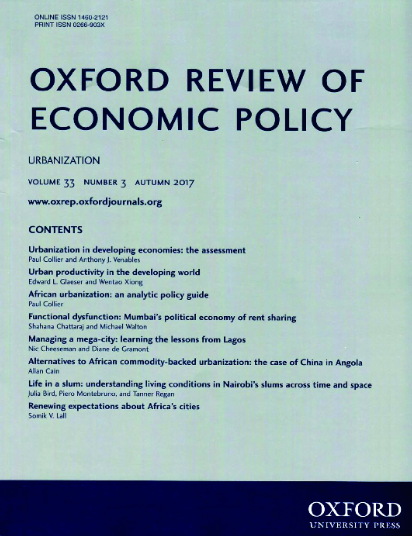从布雷顿森林体系到全球非体系:缓慢学习的考验和磨难
IF 1.8
2区 经济学
Q2 ECONOMICS
引用次数: 1
摘要
在本文中,我们分析了为什么在1971年布雷顿森林体系崩溃后,人们花了这么长时间才理解我们现在所处的全球“非体系”。我们首先描述了通胀目标制如何运作的知识——我们称之为“泰勒规则宏观经济学”——在20世纪70年代、80年代和90年代才逐渐被创造出来。然后,我们描述了在此之后,人们如何逐渐意识到国际非体系如何运作,这取决于已经存在的泰勒规则宏观经济学。然后,我们讨论了大稳健,明确指出一个运作良好的全球非体系不仅需要每个国家的通胀目制制和浮动汇率,还需要充分的财政纪律和令人满意的金融监管形式。我们描述了一个运作良好的全球非系统是如何真正整合在一起的。然后,我们讨论了这一非体系如何应对过去15年的两大挑战,即全球金融危机和新冠肺炎大流行。苏巴奇和瓦因斯在本期《牛津经济政策评论》(Oxford Review of Economic Policy)的合著论文中讨论了全球非体系未来将面临的挑战,对最近发生的事情的讨论为这一讨论提供了背景。本文章由计算机程序翻译,如有差异,请以英文原文为准。
From the Bretton Woods system to the global non-system: the trials and tribulations of slow learning
In this paper we analyse why an understanding of the global ‘non-system’, in which we now live, took so long to arrive after the Bretton Woods system collapsed in 1971. We first describe how knowledge of how an inflation-targeting regime would operate—what we call ‘Taylor-rule macroeconomics’—was only gradually created during the 1970s, 1980s, and 1990s. We then describe how, subsequent to this, an awareness emerged, also gradually, of how the international non-system might work, depending, as it does, on Taylor-rule macroeconomics being already in place. We then discuss the Great Moderation, making clear that a well-functioning global non-system would require not just inflation targeting and floating exchange rates in each country, but also adequate fiscal discipline, and a satisfactory form of financial regulation. We describe how a well-functioning version of this global non-system would actually fit together. We then discuss how this non-system has responded to two enormous challenges of the last 15 years, namely the Global Financial Crisis and the Covid pandemic. This discussion of what has happened in the recent past provides the background to a discussion, in the companion paper by Subacchi and Vines in this issue of the Oxford Review of Economic Policy, of the challenges that the global non-system will face in the future.
求助全文
通过发布文献求助,成功后即可免费获取论文全文。
去求助
来源期刊

Oxford Review of Economic Policy
ECONOMICS-
CiteScore
12.50
自引率
1.50%
发文量
41
期刊介绍:
The Oxford Review of Economic Policy is a refereed journal which is published quarterly. Each issue concentrates on a current theme in economic policy, with a balance between macro- and microeconomics, and comprises an assessment and a number of articles. It gives a valuable appraisal of economic policies worldwide. While the analysis is challenging and at the forefront of current thinking, articles are presented in non-technical language to make them readily accessible to all readers. The Oxford Review is aimed at a wide audience including government, business and policy-makers, as well as academics and students. It is required reading for those who need to know where research is leading.
 求助内容:
求助内容: 应助结果提醒方式:
应助结果提醒方式:


